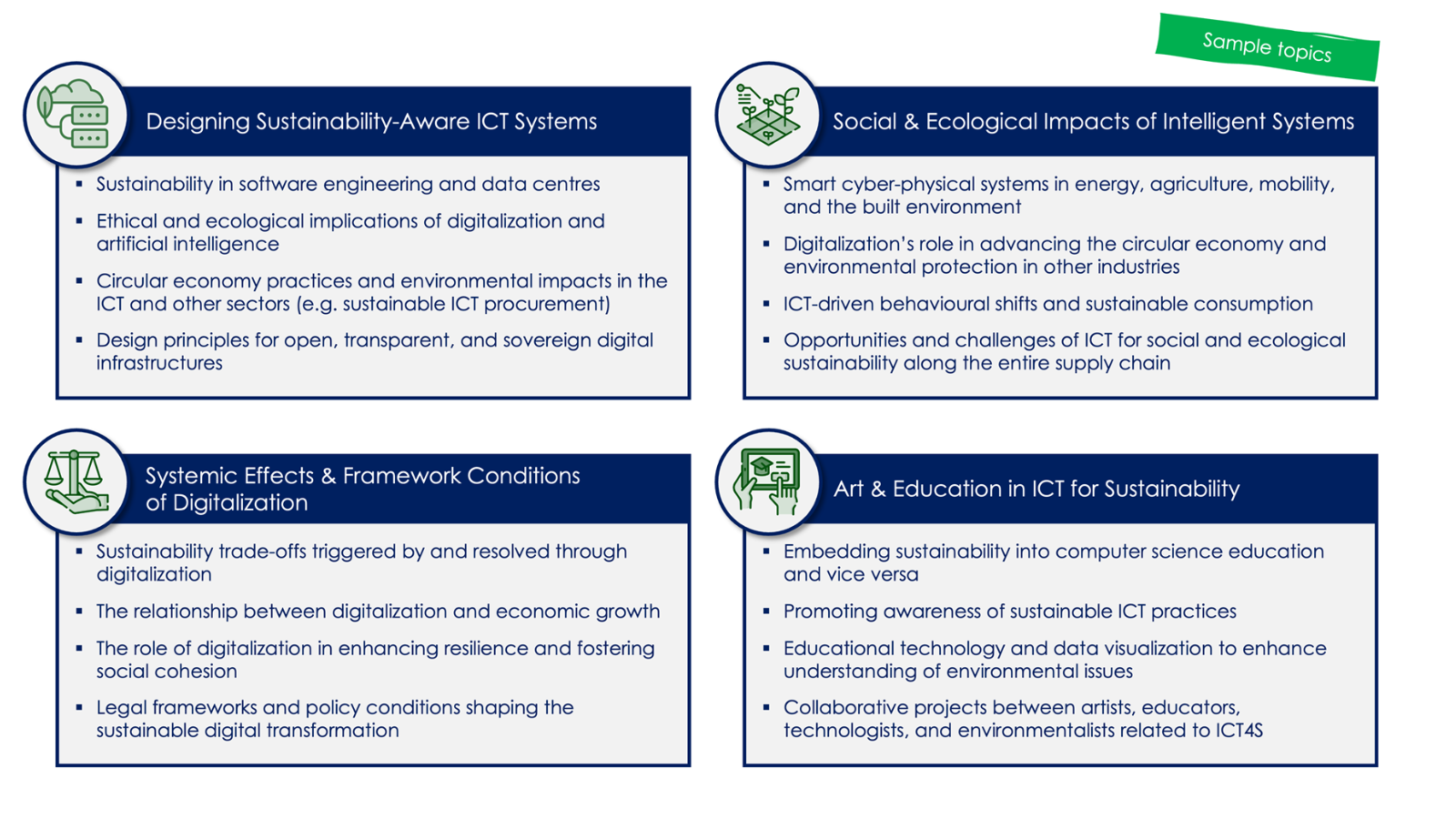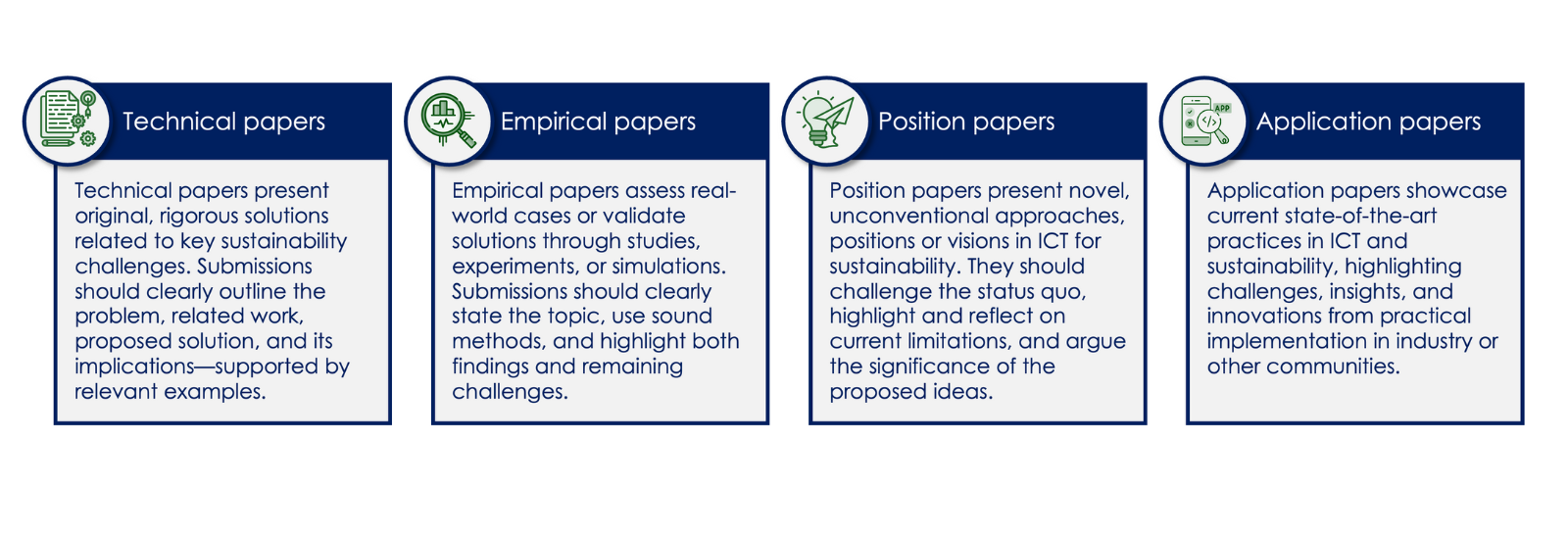Research PapersICT4S 2026
Call for Papers
The International Conference on ICT for Sustainability (ICT4S) brings together leading researchers, industry, government, public sector, civil society representatives with an interest in using, analysing, designing and deploying ICT for environmental, social, technical and economic sustainability.
The conference provides a platform for a broad spectrum of research discussing the role of ICT for sustainable development and welcomes contributions from all academic fields—including computer science, the humanities, natural, and social sciences—with a strong emphasis on collaboration across disciplines. Thereby, the conference provides a space for trans- and interdisciplinary exchange and inspiration for new ideas and solutions.
Thematic scope
Submissions should address the design, impacts, opportunities, risks, and potential solutions at the intersection of ICT and sustainability. Sample topics include, but are not limited to, the following:

Paper types
To foster broad dialogue on scientific and practical advances in ICT for sustainability, ICT4S 2026 invites original research papers—from technical and empirical studies to application-driven and exploratory work.

Global participation
The conference aims for a deep hybridization. Local and remote audiences will mix with local and remote presenters. Submit your work even if you won’t be able to travel to Bern, no matter which time zone you are in!
Review process
All submitted papers will be reviewed by three experts (double-blind). Our Program Committee includes prominent researchers at the intersection of ICT and sustainability and will ensure fair treatment of your submissions using high-review standards and well-defined criteria. Their role is not just to select papers for the conference, but also to provide useful feedback on your research.
Papers will be evaluated based on novelty, sustainability relevance and impact, soundness and rigor, transparency, and presentation. All submissions must be original, unpublished, and not submitted simultaneously for publication elsewhere.
AI-generated content
Authors should adopt the IEEE Policy.
“The use of content generated by artificial intelligence (AI) in an article (including but not limited to text, figures, images, and code) shall be disclosed in the acknowledgments section of any article submitted to [the conference]. The AI system used shall be identified, and specific sections of the article that use AI-generated content shall be identified and accompanied by a brief explanation regarding the level at which the AI system was used to generate the content.
The use of AI systems for editing and grammar enhancement is common practice and, as such, is generally outside the intent of the above policy. In this case, disclosure as noted above is recommended.”
An overview of all IEEE submission policies can be found here.
Publication of papers
ICT4S 2024 will have the proceedings published by Conference Publishing Services (CPS). Accepted submissions will be submitted to IEEE Xplore and the IEEE Computer Society Digital Library. Content will be submitted to the indexing companies for possible indexing. Indexing services are independent organizations, and CPS cannot guarantee that any particular abstract or index entry will be included in Ei Compendex or any other indexing service.
Submission process
Papers have to be submitted electronically via EasyChair in the “ICT4S 2026 Research Paper Track”. The submission link will be published soon. At the first deadline, the abstracts have to be submitted for timely reviewer allocation, followed by the full paper submissions. The detailed timeline can be found below. Deadlines are binding and extensions are not planned.

Formatting instructions
Papers have to be submitted in the IEEE conference proceedings format in PDF-Format. Papers must be written in English, not exceed 10 pages for the main body and up to 2 additional pages for the references. Papers that are too long or violate the formatting instructions will be automatically rejected. All submissions must be original, unpublished, and not submitted simultaneously for publication elsewhere.
Please make sure that your submission:
- does not exceed the respective page limit,
- is in PDF format,
- is in A4 size,
- does not have page numbers,
- has all fonts embedded in the PDF file,
- has all figures embedded in vector graphics (if not possible, use a high-resolution bitmap format of at least 300 dpi; do not use JPG, but a lossless format like PNG or GIF),
- has all text in figures and tables large enough and readable when printed,
- has a caption for every figure or table,
- has the title and all headings properly capitalized
- does not use footnote references in the abstract.
In order to prepare your submission for double-blind reviewing, please follow the instructions given below.
- Omit all names and affiliations of authors from the title page, but keep sufficient space to re-introduce them in the final version should the paper be accepted.
- Do not include any acknowledgements that might disclose your identity. Leave space in your submission to add such acknowledgements when the paper has been accepted.
- Refer to your own work in the third person, as you would normally do with the work of others. You should not change the names of your own tools, approaches, or systems, since this would clearly compromise the review process. Instead, refer to the authorship or provenance of tools, approaches, or systems in the third person, so that it is credible that another author could have written your paper.
- When providing supplementary material (e.g., tools, data repositories, source code, study protocols), do this via a website that does not disclose your identity.
- Remove identification metadata from the PDF file before submission (in Adobe Acrobat Reader, you can check their presence with File Properties, or Ctrl-D).
Questions
In case of questions, please feel free to contact the track chairs: Norbert Seyff (norbert.seyff@fhnw.ch) and Cecilia Katzeff (ckatzeff@kth.se).